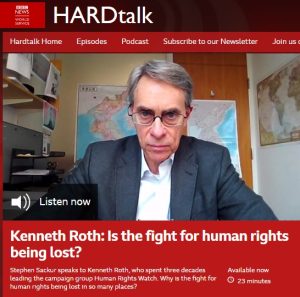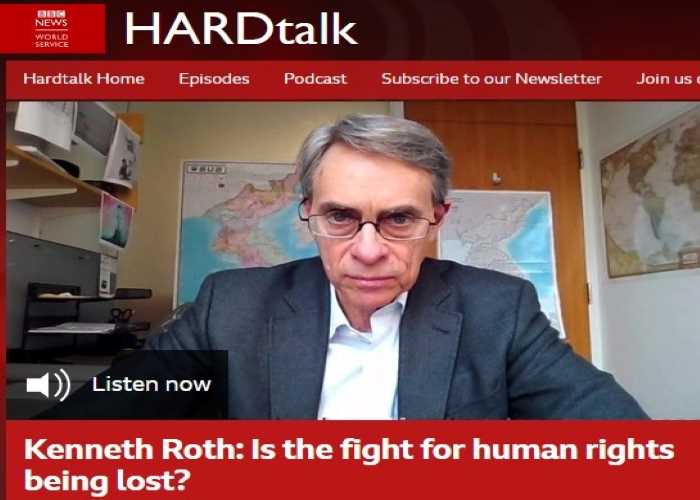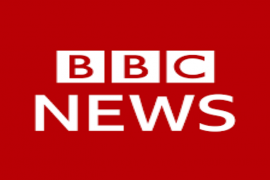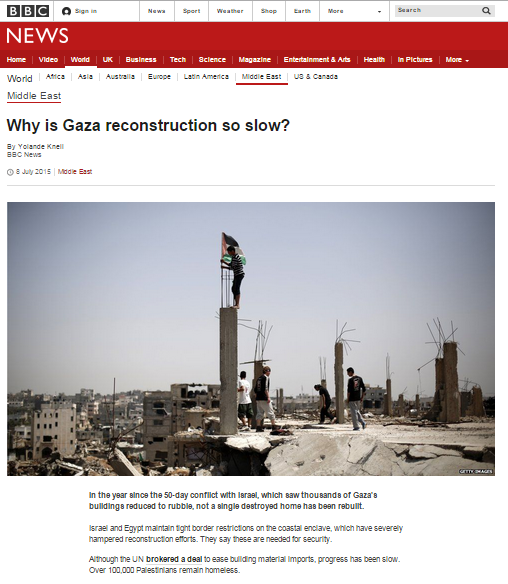On February 13th the BBC aired filmed and audio interviews with the former director of ‘Human Rights Watch‘ Ken Roth.
Readers in the UK can find the televised version of that ‘Hardtalk’ interview on BBC iPlayer. The audio version was aired on the BBC World Service radio version of ‘Hardtalk’.
From around 16:42 in the audio version, presenter Stephen Sackur (who, to his credit, had earlier raised an issue that the BBC ignored three years ago) turned the conversation to HRW and Israel. [emphasis in italics in the original, emphasis in bold added]
Sackur: “Another country with which Human Rights Watch developed a very difficult relationship was Israel. And I do need to talk to you about that. Do you believe in hindsight and with some sort of retrospect that you focused too heavily on human rights issues concerning the Israel-Palestine conflict, given everything else that was happening in the Middle East and the wider world?”
Roth: “No, not at all. I mean first of all, you know, the Israel-Palestine situation is one of one hundred around the world that Human Rights Watch regularly reports on. So, you know, it’s a tiny percentage of the organisation’s work. And even with that, as a matter of principle – we talked about this earlier – we look at all sides. So we look at not only Israeli government abuses but also abuses by Hamas, the Palestinian Authority and Hizballah when there’s a conflict in the Lebanon-Israel…in southern Lebanon. So you know we followed the same principles in Israel-Palestine, the same investigative methods and have the same human rights standards…”
Readers can judge for themselves to what extent HRW actually ‘looked at all sides’ by perusing the relevant archive page on the HRW website where reports on Israel far outnumber those concerning any of the three parties cited by Roth.
While Sackur himself responded to Roth’s claims with the question “Right, but do you actually apply the same level of focus?”, unfortunately for BBC audiences, that question went unanswered.
Sackur then raised the topic of a 2019 study conducted by UN Watch which found that “over an 18-month period Ken Roth, the head of Human Rights Watch, devoted more than 70% of his tweets alleging “illegal” acts to the criticism of one single country: Israel” to which Roth responded:
Roth: “I mean this is a classic…there are all these little micro-groups that, you know, act as if the Israeli government has never committed a human rights violation in the history of the world so they epitomise bias and then they charge anybody who criticises Israel with bias. This is classic sleaziness on their part because if you look where I was saying is illegal it was always…in fact it’s an adjective to a description of the settlements. So it came up in the context of the settlements. A lot of people don’t realise that the settlements are a violation of Article 49 in the Fourth Geneva Convention. Actually war crimes – not just illegal. So I put that adjective in there and then they said ‘oh well, you’re picking on Israel’ when, you know, there was a reason for that adjective. I didn’t need to say oh you know Russian bombardment of cities is illegal – we all know that. I didn’t need to say that, you know, the locking up of Brazilian leaders is illegal. You know there’s certain things that are obvious. People didn’t know that about the settlements.”
Unfortunately for viewers and listeners, Sackur made no effort to clarify that there are legal opinions which contradict the interpretation of Article 49 of the Fourth Geneva Convention that Roth has chosen to adopt and promote and failed to challenge Roth’s far-fetched claims concerning what “we all know”.
Sackur next raised the topic of accusations of antisemitism and their “impact” on Roth as someone “born of Jewish parents”.
Sackur: “…some of your harshest critics in Israel said that your positioning on the Israel-Palestine conflict smacked not just of being anti-Israel but being antisemitic.”
Roth: “…Now, you know, I can put up with being called antisemitic, it’s just so preposterous. It doesn’t stop me from continuing to report on Israel. But I do worry about this growing tendency to try to silence criticism of Israel by claiming that every critic is antisemitic. And I mean it’s obviously not true. […] there are many people who legitimately criticise Israel of oppression who are just labelled antisemitic and that is, you know, it’s bad for expression, for the defence of human rights but it’s bad for antisemitism…”
Sackur refrained from unpacking Roth’s disingenuous and false claim that “every critic” of Israel is silenced with claims of antisemitism. He also avoided informing audiences of statements made by Roth that include blaming Israel for antisemitic incidents in the UK and Germany.
Sackur then turned the conversation to the topic of Roth’s Harvard University fellowship, inaccurately claiming (also repeated elsewhere in the interview) that “that offer was briefly rescinded”. In fact, as explained by CAMERA’s Karen Bekker:
“Importantly, Elmendorf didn’t rescind any appointment – he refused to authorize it in the first place. So while Roth may have expected that his appointment would be finalized, in fact it never was. Roth’s (predictable) reaction was to blame Jewish and pro-Israel “donors” in the pages of the Guardian. (I once ran Human Rights Watch. Harvard blocked my fellowship over Israel,” January 10, 2023.)”
At the end of that conversation about his Harvard appointment Roth stated:
Roth: “Antisemitism is a very serious threat to Jews around the world and my concern is that if some of these parties and defenders of the Israeli government throw around the term antisemitism to try to silence criticism of Israel, people are gonna take the threat of antisemitism less seriously. They’re gonna think ‘oh this is just another censorship effort’ rather than the genuine problem and so this may be in the short term good for the State of Israel but it is terrible for Jews around the world who do face the serious problem of antisemitism.”
Sackur closed the interview at that point.
Roth’s repeated promotion of the Livingstone Formulation throughout this interview drew no response from Sackur whatsoever. While that may not be very surprising given the BBC’s dismal record of promotion of that canard, it clearly does not serve the interests of the corporation’s domestic and international audiences.
In the synopsis to both versions of this interview the BBC asked “Why is the fight for human rights being lost in so many places?”. While no definitive answer to that question was given, one contributing factor is certainly the politicisation of the issue of human rights by people such as Ken Roth, who was unfortunately given a worldwide platform by the BBC to promote his insufficiently challenged talking points.
Related Articles:
GUARDIAN JOURNALIST OR KEN ROTH’S LAWYER?
GUARDIAN BURIES THE LEDE THAT ((DONORS)) DIDN’T NIX ROTH’S FELLOWSHIP
NOW IN RETIREMENT, KEN ROTH KEEPS SINGING THE SAME OLD SONG
KENNETH ROTH REACTS TO TRUTH LIKE A VAMPIRE REACTS TO SUNLIGHT





